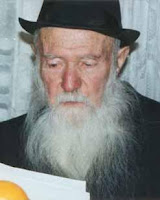Go to the synagogues or to the Kotel (the Western Wall) around midnight or early in the morning and you will hear selichot being recited, or sung if you choose a Sephardi minyan. Ashkenazi Jews start reciting selichot on the Saturday night before Rosh Hashanah. Sephardim begin a whole month before. These are prayers of repentance, asking for forgiveness and mercy as we approach the annual day of judgement.
 |
| Yemenite Jew blowing shofar |
The clarion call to repentance is the sound of the shofar, a ram’s horn. It is blown every day during the month before Rosh Hashanah, on Rosh Hashanah itself and at the end of the Yom Kippur fast. As well as calling the people to repentance the shofar echoes events in Jewish history and heralds our hopes for the future. Hearing its piercing notes recalls for us the binding of Isaac, the giving of the Torah and the destruction of the Temple and speaks of the coming of the Messiah, the ingathering of the exiles and the resurrection of the dead at the end of days.
Rabbi Moshe Tzvi Segal was a Chabad-Lubavitch Hassid. Born in the Ukraine in 1904 he and his family made Aliyah in 1920. He was one of the first members of the Beitar youth movement in Eretz Israel. He served in the Haganah defending Tel Aviv during the Arab riots of 1929, became a member of the Irgun high command and later joined Etzel (popularly known as the Stern Gang). He was the first to defy the British prohibition on blowing the shofar at the Kotel.
 |
| Rabbi Moshe Tzvi Segal |
 |
| The Tzemach Tzedek Synagogue |
For 17 years from 1930 until the Old City of Jerusalem fell into Jordanian hands in May 1948 a different young man risked arrest and imprisonment each year by blowing a shofar at the Kotel at the end of the Yom Kippur prayers. In the summer of 2010 six of the seventeen men who had defied the British decree were still alive. They gathered for a reunion at the Kotel and told their story in a video film made by Toldot Israel. Rabbie Moshe Tzvi Segal and each of those who followed him can truly be said to have fulfilled what we say in the Amidah prayer every weekday:
"תקע בשופר גדול לחרותנו"
“Sound the great shofar of our freedom”
May you have a sweet, healthy and happy New Year.
לשנה טובה תכתבו ותחתמו.
תזכו לשנים רבות.